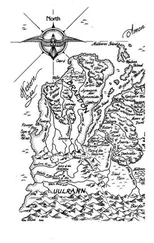David Gibbins - Total War Rome - Destroy Carthage
Здесь есть возможность читать онлайн «David Gibbins - Total War Rome - Destroy Carthage» весь текст электронной книги совершенно бесплатно (целиком полную версию без сокращений). В некоторых случаях можно слушать аудио, скачать через торрент в формате fb2 и присутствует краткое содержание. Год выпуска: 0101, Издательство: Thomas Dunne Books, Жанр: Исторические приключения, на английском языке. Описание произведения, (предисловие) а так же отзывы посетителей доступны на портале библиотеки ЛибКат.
- Название:Total War Rome: Destroy Carthage
- Автор:
- Издательство:Thomas Dunne Books
- Жанр:
- Год:0101
- ISBN:нет данных
- Рейтинг книги:5 / 5. Голосов: 1
-
Избранное:Добавить в избранное
- Отзывы:
-
Ваша оценка:
- 100
- 1
- 2
- 3
- 4
- 5
Total War Rome: Destroy Carthage: краткое содержание, описание и аннотация
Предлагаем к чтению аннотацию, описание, краткое содержание или предисловие (зависит от того, что написал сам автор книги «Total War Rome: Destroy Carthage»). Если вы не нашли необходимую информацию о книге — напишите в комментариях, мы постараемся отыскать её.
Total War Rome: Destroy Carthage — читать онлайн бесплатно полную книгу (весь текст) целиком
Ниже представлен текст книги, разбитый по страницам. Система сохранения места последней прочитанной страницы, позволяет с удобством читать онлайн бесплатно книгу «Total War Rome: Destroy Carthage», без необходимости каждый раз заново искать на чём Вы остановились. Поставьте закладку, и сможете в любой момент перейти на страницу, на которой закончили чтение.
Интервал:
Закладка:
But Fabius knew the old centurion’s movements exactly. Every morning with military precision he spent half an hour in the baths, an amusing indulgence for a hoary old soldier, and Fabius had seen him enter his favourite bathhouse behind the Temple of Castor and Pollux only a few minutes before. It was not the first time that Fabius had saved Scipio’s skin, and Fabius knew the value of becoming indispensable. But his feelings towards Scipio were those of a friend rather than a servant: in future he might be destined to be a legionary while Scipio became a general, but they had first met on equal terms on the streets of Rome when Scipio had wanted to shed his aristocratic grandeur for a night and run with the gangs, and that was how it stayed between them, even though convention dictated that in public the one must be master and the other a servant.
An official with the rod of a lictor was waving an olive branch to signal a procession and stopped him as he was about to cross the road. Fabius stood behind the crowd of onlookers and glanced up and down to see if there was a way across, but then thought better of it. If it was a religious procession the lictors would chase him down and beat him for it, and he could not afford a transgression that might jeopardize his position in the Scipio household. His friendship with Scipio Aemilianus after Fabius had saved him from being beaten up that night had been the big break of his life, the chance to escape the slums of the Tiber bank and honour his father’s memory. He remembered the last time he had seen his father in full armour, near this very spot, marching in triumph after the first Celtiberian War, a centurion of the first legion resplendent in his corona civica and the silver arm bands he had been awarded for valour. But that had been followed by years of peace, and when the legions were called up again he had been too old, too dissipated by his weakness for wine, and after that the hard times had only got worse. Fabius knew that his father’s name was one reason why Scipio’s father Aemilius Paullus had accepted him into his household as a servant, and had put his name forward for the first legion when he came of age. Had Aemilius Paullus and Scipio’s adoptive grandfather, the great Scipio Africanus, been given the power by the Senate, then Rome would not have let his father down; they would have ensured that experienced soldiers remained in the ranks and were not thrown back into civilian life where their skills were wasted and they could never settle down.
Fabius peered over the heads of the people to see what was passing. It was the twelve Vestal Virgins, garlanded in laurel and wearing white, followed by a group of girls who served as their retainers, spreading incense and flower petals over the bystanders. Among the retainers he spotted Julia, her flaxen hair visible above the others. She should have been with him today, secretly joining the boys to study battle tactics while the old centurion was out. It was Fabius’ job to escort her into the academy and then to spirit her out again by a back entrance as soon as they heard the clunk of the centurion’s staff in the corridor. Julia’s greatest dread was that she would be forced to spend so much time with the Vestals that she would become one herself, but to have missed today’s procession would have been to upset the tolerance her mother showed towards the time she spent with the young men in the academy, which was the one thing that made life as an aristocratic girl in Rome with all of its conventions and restrictions tolerable for her.
Julia saw him, flashed a smile, and he waved. Once, months before, she had come to him in the servants’ quarters of Scipio’s house and had stroked his hair, admiring its auburn curls. He had been momentarily taken aback, his heart pounding, and had told her that his hair colour came from his mother, the daughter of a Celtic chieftain imprisoned in the Tullianum dungeon under the Capitoline Hill and guarded by Fabius’ father. He had sensed Julia’s breathing quicken, excited perhaps by the exotic, by a boy who was not from her own social class and not even fully Roman, who opened out the possibilities of the world for her. But he had come to his senses and had moved out of her reach. It was not as if he were innocent of the pleasures of women; on occasion he had spent the few asses that he made on the prostibulae in the bathhouse, and he had his admirers among the girls of his own neighbourhood. But he knew there could be no hope with Julia. As a servant boy, little better than a slave, he would be whipped out of the house if they were found out, or worse. And, above all, he had known that Scipio was in love with Julia, a love that had blossomed secretly in the months that followed after Julia had become aware of his feelings, despite her own betrothal since childhood to Scipio’s distant cousin Metellus. If Fabius lost the patronage of Scipio he would never rise above the streets again. But it was Scipio’s friendship that mattered most: a friendship that had enriched his life, that had introduced him to Polybius and a world of books and knowledge that had lit his imagination and made his dream the same dream as Scipio’s, to see a world his father had seen as a soldier that he yearned to explore himself.
The procession passed, and Fabius hurried over the road towards the Gladiator School, making his way through the warren of alleyways and wooden houses until he came to the two-storey building that surrounded the practice arena. He pushed past the crippled old soldiers begging at the entranceway, past the mound of sand that was used to mop up the blood, and then the stable where they kept Hannibal, the gnarled old war elephant who was the last survivor of his namesake’s march over the Alps almost fifty years before — the final Carthaginian prisoner left alive in Rome. Fabius ran along a dark passageway and up the stairway to the closed door, careful not to brush against the sputtering tallow candles that lined the walls. Officially, the academy was a private school for the instruction of sons of senators in philosophy and history, staffed by professors recruited from the hundreds of Greek captives taken to Rome since the war with Macedonia had begun. Unofficially, it was a training school established by the elder Scipio before he died to ensure that the next generation of Roman war leaders were more skilled than the last, and better able to hold their own against the agitations of the Senate. It was this last fact that made the elder Scipio keep the academy as private as possible, away from the eyes of those who were suspicious of anything he did. In theory, the old centurion Petraeus was there only to instruct the boys in swordplay, but for two mornings of the week behind closed doors they were allowed to simulate the great battles of the past, battles that the centurion or other veterans brought in for the purpose would mastermind for them based on their own experience of tactics and combat.
He pushed the door open and crept inside, shutting it quietly behind him. The room was large, windowless where it faced the street outside but with an open gallery on the other side overlooking the arena in the courtyard below. Two slaves stood in attendance against the back wall, holding trays with fruit and water pitchers, beside an open passageway coming up from the courtyard where the old centurion would make his entrance. In the centre of the room was a large table, some three arms’ breadths in length, covered with the diorama of a battlefield; the terrain was represented by sand and stones and tufts of grass, and the opposing armies by coloured wooden blocks arranged in rows. Fabius knew exactly which battle was being represented. When Polybius had taught him Greek he had read him a passage on the battle from the history of the war against Hannibal that Polybius had been writing ever since he had arrived from Greece as a willing captive who had always been a great admirer of Rome. And the old centurion had told Fabius about it, an eyewitness who had fought there beside the elder Scipio himself. Fabius had gone to the tavern one evening with him and had spent hours drinking wine and listening to the stories. It was the Battle of Zama, the final confrontation with the Carthaginians in North Africa that had forced Hannibal to surrender and the city of Carthage to lay itself at Scipio’s mercy, almost thirty-five years ago now.
Читать дальшеИнтервал:
Закладка:
Похожие книги на «Total War Rome: Destroy Carthage»
Представляем Вашему вниманию похожие книги на «Total War Rome: Destroy Carthage» списком для выбора. Мы отобрали схожую по названию и смыслу литературу в надежде предоставить читателям больше вариантов отыскать новые, интересные, ещё непрочитанные произведения.
Обсуждение, отзывы о книге «Total War Rome: Destroy Carthage» и просто собственные мнения читателей. Оставьте ваши комментарии, напишите, что Вы думаете о произведении, его смысле или главных героях. Укажите что конкретно понравилось, а что нет, и почему Вы так считаете.












